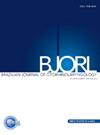Advanced age is not a predictor for cochlear implantation outcomes in adults with moderate to profound sensorineural hearing loss
IF 1.7
4区 医学
Q2 OTORHINOLARYNGOLOGY
引用次数: 0
Abstract
Objective
Hearing impairment is a common disability in elderly people. With an ageing population, it is expected that the number of people with age-related hearing loss will grow, and a proportion are likely to become Cochlear Implant (CI) candidates. The aim of this study is to investigate whether the age at which a person receives a CI has an impact on their objective speech understanding outcomes and subjective, self-reported outcomes within the first 12-months of CI use.
Methods
242 CI recipients participated in this study. Participants were divided into 3 groups according to age at implantation: 72 younger adults (18–60 years); 109 older adults (60–75 years); and 65 elderly adults (>75-years). Benefit of CI use was assessed via speech understanding and patient-reported measures. Speech understanding in quiet was assessed via the Consonant-Nucleus-Consonant words test. Speech understanding in noise was assessed via the Bamford-Kowal-Bench Adaptive speech-in-noise test. Self-perceived hearing ability was assessed via the short from of the Speech, Spatial and Qualities of Hearing scale. Tinnitus reduction, if applicable, was assessed via the Tinnitus Reaction Questionnaire. All 4 assessments were completed at 4 intervals: preoperatively, 3-, 6-, and 12-months of CI use.
Results
For the entire cohort over time, significant improvements were found for speech understanding in quiet (p < 0.0001), and self-perceived hearing ability (p < 0.0001). Between the three groups, there were no significant differences in any postoperative (post-Op) assessment for all study outcomes.
Conclusion
Each age group had improved speech understanding and self-perceived hearing abilities after 12-months of CI use. No significant differences were found between groups at all post-Op test intervals. We therefore conclude that elderly people (>75-years) who are acceptable CI candidates should be offered the same opportunity to benefit from CI use as younger adult candidates.
Level of evidence
Level 3.
求助全文
约1分钟内获得全文
求助全文
来源期刊

Brazilian Journal of Otorhinolaryngology
OTORHINOLARYNGOLOGY-
CiteScore
3.00
自引率
0.00%
发文量
205
审稿时长
4-8 weeks
期刊介绍:
Brazilian Journal of Otorhinolaryngology publishes original contributions in otolaryngology and the associated areas (cranio-maxillo-facial surgery and phoniatrics). The aim of this journal is the national and international divulgation of the scientific production interesting to the otolaryngology, as well as the discussion, in editorials, of subjects of scientific, academic and professional relevance.
The Brazilian Journal of Otorhinolaryngology is born from the Revista Brasileira de Otorrinolaringologia, of which it is the English version, created and indexed by MEDLINE in 2005. It is the official scientific publication of the Brazilian Association of Otolaryngology and Cervicofacial Surgery. Its abbreviated title is Braz J Otorhinolaryngol., which should be used in bibliographies, footnotes and bibliographical references and strips.
 求助内容:
求助内容: 应助结果提醒方式:
应助结果提醒方式:


